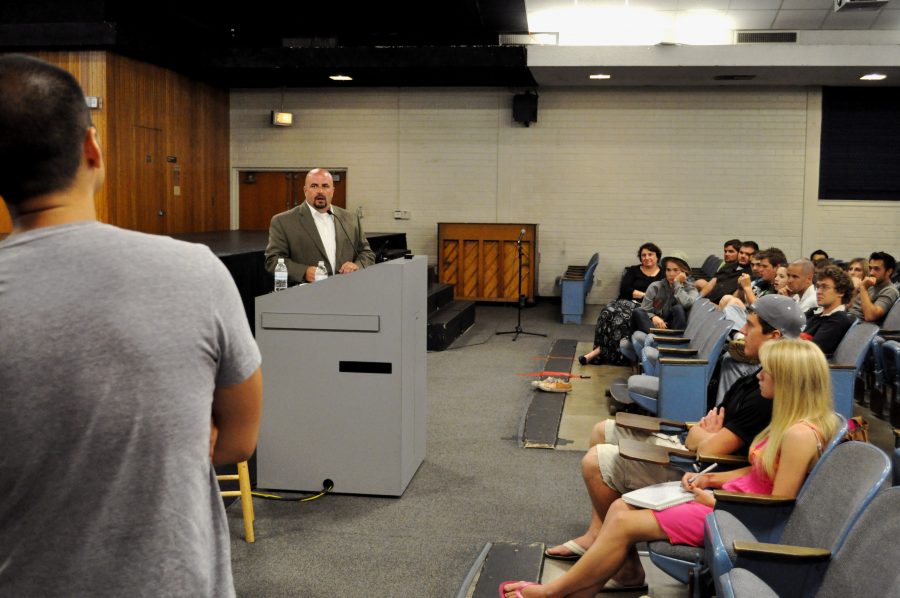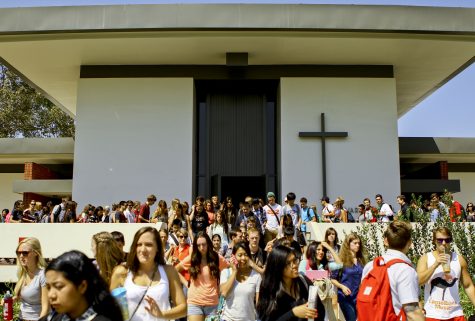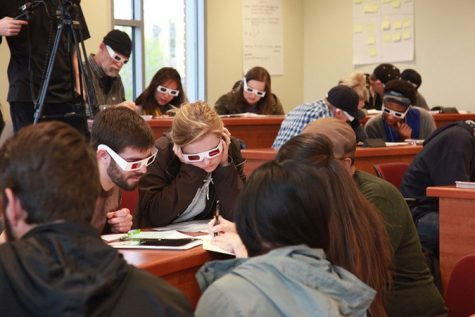Documentary highlights Israeli-Palestinian conflict
Documentary takes a fresh look at the Israeli-Palestinian conflict.
Director Porter Speakman addresses student questions at Thursday’s screening of the documentary “With God on Our Side.”
August 30, 2010
Burrowed between Africa and Southwest Asia is a cluster of the infamous dozen countries we like to call the Middle East, a name bounced around like a hot potato among reporters, policymakers, and average joes and janes; an unsolvable, scorching riddle.
Porter Speakman Jr., a 38-yr-old Colorado family man, not only held the heat, but walked right into one of the most fiery controversies since 1948: the Israeli-Palestinian conflict.
While growing up an evangelical in the South, Speakman said he developed a particular view about the Israeli nation and Palestinian people. But his perspective was flooded with new information when he decided to go and see for himself.
“My wife and I had the opportunity to spend a lot of time in the Middle East, and when you do that and you get to meet with Palestinians and kind of see what’s happening, you have a lot of questions about everything you always were taught,” he explained.
After visiting the region, Speakman reported a change in his historical and theological views about the conflict and brought teams of church members over from the U.S. for a firsthand experience of Palestine. The transformational journeys of these individuals inspired him to make the documentary “With God On Our Side.”
Documentary comes to Biola
Speakman’s film debut lit up the screens before an audience of fifty in Sutherland Hall Thursday. While technical difficulties delayed the showing for almost an hour that evening, those who remained viewed a passionate dialogue about Christian Zionism and the plight of Palestinians in Israel set against the backdrop of the Land Beautiful itself.
The film opens with a wide pan of a Zionist rally, blue-starred flags fluttering across the screen while Pastor John Hagee addresses a roaring crowd with the following statement:
“I repeat, we cannot change the past. Christians and Jews can unite and we can control the future. 50 million evangelicals with 5 million Jewish people in North America is a match made in heaven.”
Hagee, the national chairman of Christians United for Israel (CUFI) is one of several interviewees providing the documentary with the Christian Zionist view with respect to the endless Israeli-Palestinian conflict.
Examining Christian Zionism
While defining and evaluating Christian Zionism could require an entire film series, the documentary identifies it as a growing movement among evangelicals that promotes support for Israel’s policies and land interests.
Zionists like Hagee pledge their support for Israelis’ right to live in the land that was given to ancient Israel in the Old Testament. They oppose forces, such as terrorist groups, that threaten the peace and security of Israelis on Israeli land and that undermine the existence of the state itself, according to CUFI’s Israel pledge.
The beliefs of Christian Zionists have roots in dispensationalist theology, which is addressed in the film. This belief system holds to literal interpretation of Old Testament prophecies about Israel and distinguishes between the church and Israel (the church is not a continuation or replacement of Israel), Michael J. Vlach, Ph.D., according to founder of TheologicalStudies.org.
Christian Zionists believe that there is a biblical basis for supporting and promoting the decisions of the current nation of Israel and for viewing Israelis as a special ethnic group whose future is unique and significant.
“With God on Our Side” presents the implications of the Christian Zionist view, particularly the “justification of Israel’s occupation and settlement of the West Bank, Golan and Gaza,” as the documentary website states.
Looking at both sides
The documentary bobs and weaves between fact and narrative, featuring brief back-to-back interviews with Christian Zionists and challenging viewpoints, before introducing Palestinians whose stories put a face to cognitive arguments.
Speakman addressed the film’s slant toward the Palestinian plight after the showing, explaining the film as the opening of a new can of worms rather than a one-sided, complete presentation.
“Is the film balanced?,” Speakman said in answer to a student question. “No. But I think it’s fair to a certain perspective and that this is one piece of this great puzzle that has to be figured out. It’s not trying to say, ‘This is all of it, and all we need to deal with is this.’ We are saying, ‘Here is this perspective that most American Christians are not getting.’”
The struggles presented by the film involve the broken nature of Palestinian life and the irony of a Christian movement that communicates favoritism of one ethnic group (Israelis) over another (Palestinians).
Dr. Salim Munayer, a Palestinian Christian in the film, explained the rejection he felt when a Christian he met withdrew from a handshake after Munayer stated his ethnicity during a visit to an American church.
Several Palestinian grievances stand out in the film, including the difficulty of daily survival, frustration of land settlements, and rejection of Palestinians by Jews and Christians.
One Palestinian woman in the film shared her fear to have her baby because other Palestinian women had reported trouble getting through checkpoints at the time of their pregnancies. Another grievance addressed is that the security barrier Israel built in the West Bank was not built on the agreed Israeli border and has divided Palestinian villages and made travel to short distances long and tedious.
The end of the film directs viewers to ultimately look beyond a policy or idealism, like Christian Zionism, to the people suffering because of the situation in Israel; as the narration concludes, “We think that the key approach to the Middle East is humanity.”







